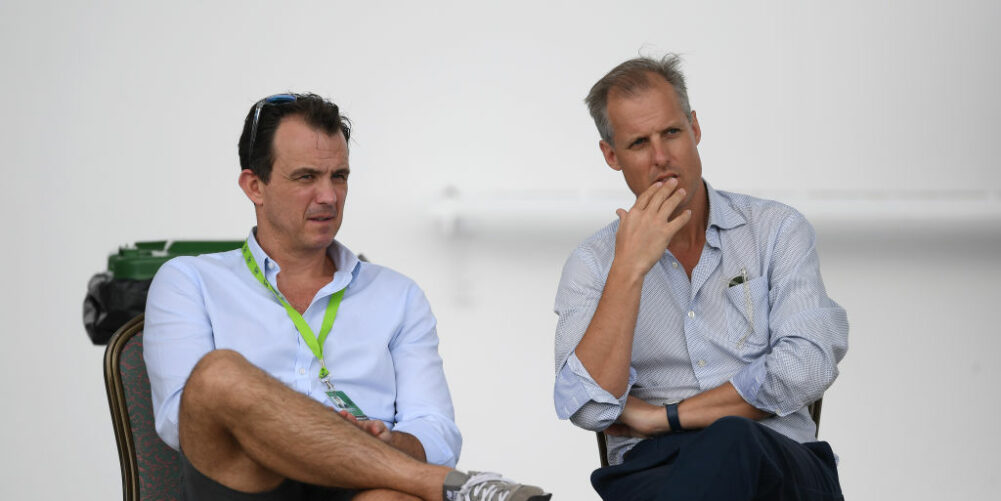Tom Harrison has insisted it was impossible to return Test cricket to terrestrial TV when the ECB negotiated their new bumper £1.1billion broadcast deal that will run from next year.
The lucrative agreement will see some cricket broadcast on
free-to-air platforms as the BBC show 10 games from the new 100-ball
competition and two England T20 internationals.
Getting anything more to a wider audience, though, was, says
ECB CEO Harrison, impossible without damaging the financial status of the game
in this country.
It comes after Graeme Swann admitted last week the lack of
exposure of cricket on free-to-air TV meant England’s players would never be
household names.
Terrestrial TV stopped broadcasting live cricket when
Channel 4 lost the rights to Sky 14 years ago. Although the satellite station
has done a superb job covering the sport, the absence of events such as the
Ashes on free-to-air channels has seen the game’s popularity dip.
Swann, England’s best spinner of the modern era, revealed his recent stint on Strictly Come Dancing led to an upsurge in his public profile, saying: “For me, it was 10-fold when I did Strictly. When there are 12 million people watching you dance, you’re far more famous than you are for playing cricket – which is a shame, because I was really good at cricket.”

Asked whether England’s current stars would ever become as
famous as the likes of Sir Ian Botham and Andrew Flintoff, Swann added:
“Probably not – because cricket is not as wide-reaching as it used to be. You
never know what’s going to happen, and with the BBC getting involved in ‘The
Hundred’ hopefully these players will get into more households.”
Harrison is aware of such concerns and, responding to
Swann’s words, replied: “It’s really difficult. The challenges around
broadcasting Test cricket on terrestrial TV become very different.
“We’ve had to strike a balance between exposure and revenue and reach. That’s tricky.
“It’s important for us to grow the game in England and Wales. So we have to find the balance between reach and revenue and I think we’ve pushed it as far as we can without really compromising very heavily on the revenue elements.
“We could have pushed the axis back to revenue and generated more money, but we wanted to get the balance right.
“We’ve struck the objective of reaching the widest possible audience. If you push that to one or two Tests, the impact on the revenue would be dramatic. Twenty years of experience tells me we got that right.”
The Hundred is the vehicle Harrison hopes will increase
cricket’s wider popularity and the recent interest shown by West Indies star batsman
Chris Gayle in playing in next year’s inaugural edition of the tournament was
welcomed by Harrison.
“We’d love to have Chris involved,” he said. “That was
exciting. I’m keen to have a conversation and see what he thinks. To get his
views.
“He’s played in probably all the major tournaments around
the world. His view is very much worth listening to see how we can make this
even more exciting.”
Wider cricketing politics and the hegemony of the IPL means
Indian players will not be available for the Hundred.
However, Harrison is confident the competition will be able to attract star players from
overseas.
“I think players will want to play in this,” he said. “We’ll
demonstrate an ambition behind this that is very pure and can enhance players’
skills under pressure. That’s one of the attractions of the format. We’ll make
it attractive to players to come and play. England has always been a place the
big players want to come and play.”
After getting the playing conditions for The Hundred
approved last week, Harrison’s next job will be to come up with names and
identities for each of the eight new teams that will be staged at eight Test
venues.
“There’s a huge summer of stuff ahead of us,” he said. “Work
is being done at the moment on those team identities. There’s a lot of research
into building authenticity on those so people can relate to them from those
communities and beyond.”
That may be the biggest challenge of making The Hundred work – and increasing cricket’s wider popularity –because if nobody is invested in the teams people will quickly lose interest.
CHRIS STOCKS / Photo: Getty Images












